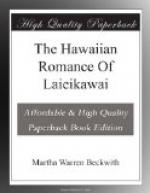And during this transfer of attention from heaven to earth the objective picture of a paradise in the heavens or of an underworld inhabited by spirits of the dead got mixed up with that of a land of origin on earth, an earthly paradise called Hawaiki or Bulotu or “the lost land of Kane”—a land about which clustered those same wistful longings which men of other races have pictured in their visions of an earthly paradise—the “talking tree of knowledge,” the well of life, and plenty without labor.[3] “Thus they dwelt at Paliuli,” says Haleole of the sisters’ life with Laieikawai, “and while they dwelt there never did they weary of life. Never did they even see the person who prepared their food, nor the food itself save when, at mealtimes, the birds brought them food and cleared away the remnants when they had finished. So Paliuli became to them a land beloved.”
Gods and men are, in fact, to the Polynesian mind, one family under different forms, the gods having superior control over certain phenomena, a control which they may impart to their offspring on earth. As he surveys the world about him the Polynesian supposes the signs of the gods who rule the heavens to appear on earth, which formerly they visited, traveling thither as cloud or bird or storm or perfume to effect some marriage alliance or govern mankind. In these forms, or transformed themselves into men, they dwelt on earth and shaped the social customs of mankind. Hence we have in such a romance as the Laieikawai a realistic picture, first, of the activities of the gods in the heavens and on earth, second, of the social ideas and activities of the people among whom the tale is told. The supernatural blends into the natural in exactly the same way as to the Polynesian mind gods relate themselves to men, facts about one being regarded as, even though removed to the heavens, quite as objective as those which belong to the other, and being employed to explain social customs and physical appearances in actual experience. In the light of such story-telling even the Polynesian creation myth may become a literal genealogy, and the dividing line between folklore and traditional history, a mere shift of attention and no actual change in the conception itself of the nature of the material universe and the relations between gods and men.




